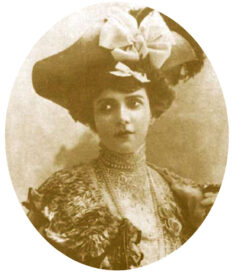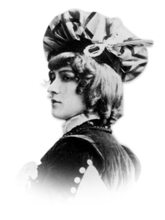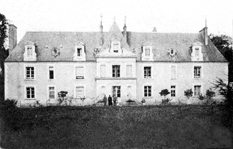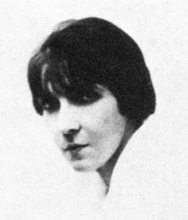
Eve Lavallière, the stage name of Eugénie Fenoglio, was born in Toulon, France, on April 1, 1866. The second child and only daughter of Emile and Albanie Fenoglio, she later described her painful youth. “As a child, I knew not what the love and care of a mother was. My life was tears and suffering from the time I reached the age of reason.”
Her father, a tailor, alcoholic and libertine, often gave himself over to jealous brooding and fits of rage. Her mother often had to flee with the children, seeking refuge in relatives’ homes, until her husband had calmed down. This continued until one day, he shot and killed his wife, pointed the pistol at his daughter but did not shoot, and then shot himself.
Eve lived a life of privation and suffering until entering a theater company. Her beauty, voice and poise took her to the best theaters in Paris. She became the foremost actress in France and the idol of the multitudes. The entire world viewed her coiffures and clothing as models and ran after perfumes, soaps and cosmetics “à la Lavallière.”
King Carlos of Portugal, King Leopold II of Belgium, King Edward VII of England, Henry of Bavaria, diplomats, magnates, and princes all came to hear and applaud her. Dazzled by glory, she threw herself “into the vast sea of sin.”
“Gold ran through my hands,” Eve confessed. “I had everything the world could offer, everything I could desire. Nevertheless, I regarded myself the unhappiest of souls.” Despite living in a rich palace in Paris, surrounded by luxury, with a carriage and even an automobile—then very rare—at her disposal, she felt tortured by remorse. More than once she attempted suicide, even once after a magnificent performance in London.
On Her Way to Damascus
In June 1917, Eve wanted to rest far from the world’s agitation to prepare the repertoire of songs and pieces she was to perform in the United States. So she rented the palace of Porcherie in Chanceux, near Tours. She retired there with Leonia, a young Belgian refugee she had met in Paris in 1915 and who accompanied her as a lifelong confidante.
The trustee of this palace was the parish priest, Father Chasteigner, a simple, austere and pious man, genuinely solicitous for his parishioners’ souls.
The day following Eve’s arrival was a Sunday. Father Chasteigner, noting her absence from Mass, called upon her to express his concern. Eve promised him she would not miss Mass again, and on the following Sunday, when the good pastor preached on the great converted sinners, she attended the Mass with a frivolous attitude.

Returning to the palace that afternoon, the pastor commented to Eve, “What a pity that you have no faith!”
“But what is faith?” replied Eve, in the tone of one who has permanently lost it.
She then told him of her experiences with spiritism, in which, she said, the devil took part. “I took advantage of the occasion to ask him to restore my youth, which was what I most desired, and to cure me of enteritis. Satan promised he would do so on the condition that I would become his. I accepted, adding that my lifestyle was perfect for gaining him many adepts. Obviously quite content, he disappeared.
“Some days later I was at another session, with a new presence of the devil. I denounced him for failing to fulfill his promise. In reply, he guaranteed that he would grant what I asked, but under one more condition: that I not bless myself when I encountered a funeral. That was the only vestige of religiosity that remained in me.
The Devil’s False Promise of Happiness
“But Satan still did nothing for me. In the following session, filled with indignation, I called him an impostor and a cheat. By then I had concluded that spiritism was nothing but a farce and that the devil did not exist.”
“Well, I assure you that he exists,” the good priest said, and with that, he mounted his bicycle and left without further ceremony.
Eve, struck by his conviction, began to think. “If the devil exists, God also exists. And if God exists, what am I doing in this world? What am I doing with my life?”
“On the following morning,” Leonia recalls, “we were walking in front of the castle when the pastor appeared.”
“Mademoiselle,” he said, “what you told me yesterday disturbed me. I confess that I spent the better part of the night in prayer, asking God to inspire me in your regard. I also celebrated Holy Mass for the same intention. Here, I brought you The Life of Saint Mary Magdalene, by Father Henri Lacordaire. Read this book on your knees and you will see what God can do with a soul such as yours.”
“After lunch,” Leonia continues, “Eve settled down near the kitchen and, opening the doors so that the servants might hear, began to read in a loud voice. Enthusiasm seized her. Never had I heard her read with such conviction. Sitting at her feet, I began to cry. The servants were likewise moved. Eve continued reading, her voice broken by sobs.”
Eve and Leonia spent the rest of the week in piety and recollection.
“And I, Reverend Father?”
“Sunday arrived, the tenth of June,” says Leonia. “We went to Mass, but Eve’s disposition differed completely from that of the previous Sunday. It was on this day, during lunch, that I ventured to say to her, ‘I would like to make my first Communion. I have reached 23 years of age without ever receiving, but I want to do so.’”
Eve was quite moved. Not only did she encourage Leonia, but offered to make the necessary arrangements and affirmed that she too would receive Holy Communion with her. At the same time, she told her, “From now on do not address me as ‘my lady.’ Simply call me ‘Eve,’ for you are my sister and I am yours.”
When the pastor arrived later and learned of Leonia’s resolve, he promised to assist her. Since she first needed instructions, he said he would provide her a catechism. The priest then prepared to leave, but Eve detained him.
“And I, Reverend Father?”
“You?”
“Yes, me! I promised this little one that I would help her, be her sponsor, and receive Holy Communion with her.”
“But…”
“Yes, I know well. I am a sinner and have not lived as a Christian, but even so, I hope I still have the right to return to God.”
Leonia writes, “I can still see Eve on the main avenue of the palace, walking decisively at the pastor’s side and, in a loud voice, accusing herself publicly of her sins. The good priest seemed embarrassed.”
“Wait! Wait a moment!” he protested. “And above all, don’t shout so loud!”
“Wait? Wait for what? Can Leonia’s happiness not also be mine?”
Finding the Beauty of the Church and the Route Back Home
“It’s just that… it’s that, compared to you, Leonia is a child. Her case is simple. You, you are Eve Lavallière… you are well known… your life is public. I cannot treat you in the same manner. Moreover, you gave yourself over to spiritism. We are talking about a reserved sin.”1
“Oh, my God! How unhappy I am! God does not concern Himself with me because I am such a sinner.”
“Be calm, Mademoiselle! God does love you, and to prove that, I shall leave immediately for Tours, to request the necessary permission.”
“And if they do not wish to grant it?”
“They will. What motive would they have for refusing? Mademoiselle, I will be back in less than a hour, and I will come with all the powers.” With that, the good priest disappeared on his bicycle. Eve remained in a state of anxiety, lamenting and weeping.
Eve’s sole consolation amid her sorrow, from Leonia’s account, was her confidence in Our Lady! “How good it now feels to think of her. In times past I used to love her, and I never completely forgot her. I used to send her the flowers they offered me. She will have pity on me!”
Nevertheless, as she waited, Eve’s anxiety grew. Despair nearly took hold of her. Falling upon her knees, she raised her hands to Heaven. Bathed in tears, she exclaimed, “Lord, take me! Send me death, I can endure no more!”
Just then, Leonia, peering through the window, shouted, “Good news! I see him, I see him at last! He is pedaling with all his strength!” Eve rushed out to meet him.
 Learn All About the Prophecies of Our Lady of Good Success About Our Times
Learn All About the Prophecies of Our Lady of Good Success About Our Times
“For the rest of my life,” writes Leonia, “I will never forget her great cry of joy. I will ever see her there, kneeling on the grass, expressing to God her happiness and gratitude.”
“The peace of the Lord be with you, my daughter!” said the priest, leaping from his bicycle. “The Vicar-General immediately gave me all the authorizations requested.” Eve stood up, calmed, transfigured. With what attention and gratitude she heard those words of peace!
For an entire week the two friends prepared themselves for confession and Holy Communion. They walked through the wheat-covered fields each morning to the rectory. There they sat side-by-side on the old sofa in the parlor and, like two well-behaved children, recited their catechism lesson. In the afternoon, Father Chasteigner would go to the palace to speak of Heaven and the things of God. Father Chasteigner gave each of them a Rosary, and it was Eve who taught Leonia how to pray it. Preparing for their general confessions, “We wrote out our sins on sheets of paper so as not to forget anything,” said Leonia.
On the afternoon before the important day, the two were in Eve’s room saying their prayers aloud. Eve said, “When I was a child, on the day before first Communion day, we used to ask forgiveness of our parents for the faults we committed against them.” Then, throwing herself on her knees at Leonia’s feet, she implored, “Forgive me, Leonia, for the bad example I have given you and all the affliction I have caused you.” Leonia, in turn, did the same, and afterwards they retired to await the great day.

Dead to the World
Morning finally dawned. It was overcast and raining. “Naturally,” said Eve, “today you have precedence, for you are making your first Communion. Confess and receive Holy Communion ahead of me.”
They found the church draped in mourning, for a Mass was going to be offered later for a soldier killed in the war. “They are preparing for a funeral,” declared Eve. “And on this day, Leonia, we will also bury our life of sin.”

“Father Chasteigner was waiting for us in the deserted church,” Leonia recalls. “He lit a candle before the image of the Most Holy Virgin and entered the confessional. I went in first and knelt down. After I had confessed, Eve took her turn. After her confession I had the impression that she had already received Holy Communion, such was the purity of her countenance and so great her recollection.”
The Happiness That Can Only Come From God
Father Chasteigner returned to the sanctuary. Eve and Leonia knelt expectantly at the Communion rail. “While lighting the altar candles, the Reverend Father’s eyes were bathed in tears. As it had been agreed, I received Communion first and Eve right after. The priest’s hand trembled upon giving her the Sacred Host. She was white, as if dead, upon receiving her God. Returning to my place, I remained only a short time in recollection, for prolonged prayer was not for my temperament. But Eve seemed in another world.
“We had been invited to have brunch in the rectory. At a sign from the Reverend Father, I called Eve several times. But she, deeply absorbed, heard nothing. Finally, Father Chasteigner went and roused her himself and she returned to earth.
“What a joyful and radiant celebration! Afterwards, we returned on foot through the sun-drenched fields, the sun having overcome the clouds and rain. Eve was exultant with joy. ‘Does it not seem to you, Leonia, that the fields have prettier tones and that the flowers today are more beautiful than ever?’ We felt ourselves as delicate as shadows.
“Eve always considered that day, June 19, 1917, as the most special day of her life. She considered it the day her life really began. She renounced the theater forever, canceled her contracts, rid herself of her jewels, and repudiated all that reminded her of her worldly life. After her conversion, she was to affirm, ‘It was the devil that led me to God!’ ‘My resolution is made,’ Eve wrote. ‘From now on, only Jesus has a right to my life, for He alone gave me happiness and peace.’”
A True Repentance
“She left Paris in order to be safe from its dangers, distributing her immense fortune to the poor, the missions, and religious houses, and went to live in remote locales. She asked of God much suffering in order to atone for her past sins and ascend to the heights of contemplation, virtue and sanctity.”
The Divine Majesty granted her request for suffering in a variety of ways. For example, she desired to enter a convent to expiate her sins and to labor for the conversion of sinners. Notwithstanding her great ability to love and her purity of heart, she was repeatedly rejected on account of her poor health and notoriety. It was a trial that she fully accepted, realizing it to be God’s will.
For four years she devoted seven months a year serving on a lay-missionary nursing team in Tunisia, but poor health and periods of depression forced her to give up this work and return to France. There, with Leonia, she led a life of prayer, meditation, almsgiving and much suffering from illnesses.
She, who had been the toast of Paris, faced extreme suffering at the end of her life. There was not one of her once-beautiful features that did not become a means of expiation, sanctification and apostolate. Rendering gratitude to God, Eve herself said, “I have sinned through these faculties, good Lord. Now I thank Thee for permitting me to expiate my sins through this suffering.”
Saint Francisco of Fatima Calls Us to Make Special Reparation
In 1929, a large Parisian newspaper published an interview of the former celebrity.
“Do you suffer a lot?”
“Yes, horribly,” she responded.
“Have you any hope of being cured?”
“None. But I am so happy! You cannot imagine how great my happiness is.”
“Even with so much suffering?”
“Yes, and because of it. I am in God’s hands. Tell my friends of days gone by that you met the happiest person on earth.”
In her last letter she wrote, “All my being and all my will are turned toward this last end: to love God, Who loves me so much in spite of my past and present miseries.”
She died on July 10, 1929, at the age of 63. On her grave was placed a simple cross with these words, engraved according to her request:
I left everything for God;
He alone is enough.
O Thou Who didst create me,
Have pity on me.
Science Confirms: Angels Took the House of Our Lady of Nazareth to Loreto

